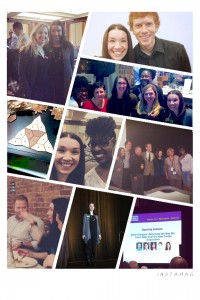 My brain is still on overload from the NCTM Regional Conference in Nashville. I can’t count how many times I engaged with Twitter/blogger faces in 3D whom I’ve respected virtually since I learned about this Twitter/blog thang. What a thrill to connect and learn from each other in person.
My brain is still on overload from the NCTM Regional Conference in Nashville. I can’t count how many times I engaged with Twitter/blogger faces in 3D whom I’ve respected virtually since I learned about this Twitter/blog thang. What a thrill to connect and learn from each other in person.
Add to this thrill, having the opportunity to help new-to-Twitter folks at the #MTBoS (Math-Twitter-Blog-o-Sphere) booth in the exhibit hall as well as in Twitter-themed sessions. Watching the A-Ha sparkle in the eyes of folks as they signed up for Twitter and entered the #NCTMregionals and/or #MTBoS hashtag(s) for the first time was… awesome! Once your eyes are open to this parallel Twitter-math universe, you just can’t look away.
Come visit the #MTBoS booth at the TN #NCTMregionals. @gfletchy did a great job setting it up. pic.twitter.com/m9io7EymqF
— Andrew Stadel (@mr_stadel) November 18, 2015
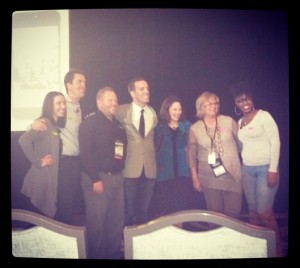 When I was invited to be part of the opening keynote session nearly a year ago, I think I turned my head to the left and the right and asked, “Who… me?” To be counted among the likes of Graham Fletcher, Robert Kaplinsky, Laila Nur, and Andrew Stadel was an honor I can’t really articulate. Add to that being valued as a 5-person team by the hugely respected organization that NCTM has been throughout our careers and well… I’m just blown away that I had this opportunity is all. “Thank you” falls short… but… thank you. (Catch the HOMEWORK I assigned in my portion of the keynote, as well as a recording of the entire opening session thanks to Mike Flynn here.)
When I was invited to be part of the opening keynote session nearly a year ago, I think I turned my head to the left and the right and asked, “Who… me?” To be counted among the likes of Graham Fletcher, Robert Kaplinsky, Laila Nur, and Andrew Stadel was an honor I can’t really articulate. Add to that being valued as a 5-person team by the hugely respected organization that NCTM has been throughout our careers and well… I’m just blown away that I had this opportunity is all. “Thank you” falls short… but… thank you. (Catch the HOMEWORK I assigned in my portion of the keynote, as well as a recording of the entire opening session thanks to Mike Flynn here.)
So many take-aways to share… but I’ll try to be concise here and focus on three biggies (to me).
(1) Teaching lessons that are problem-based is a good thing. If I had a dollar for every time I heard “3 Acts” or “Dan Meyer” I would have walked away from this conference with a killing. I really wish I would have kept a tally. From Graham Fletcher and Michael Wiernicki’s Apple-Cube-Balance task, to Robert Kapinsky’s In-N-Out Burger task, to Andrew Stadel’s Swing-Wrapping task, to Dane Ehert’s Elevator-or-Stairs task (and these are sessions I went to – I’m sure there were more!) the message was both consistent and clear:
- Give kids the chance to formulate their own questions and mathematical need for information that has not yet been provided. Provide only the information students ask for.
- Give kids the opportunity to work SILENTLY and INDIVIDUALLY for a few minutes first to avoid being bulldozed by the boisterous leader-types in cooperative settings (we love those kids, but the quiet ponderous kids deserve mathematical think-time too).
- VALUE students’ noticings and wonderings… even if some are a little off the path *you* want them to travel. VALUE even some of the silly and/or non-mathy responses… kids need to feel safe in their educational space, and we do not want to crush them when they speak out. Speaking up in math class can be tough for kids, so WE need to help guide them to apply their wonderings to MATH.
- Provide students with an “iterative framework” to structure and guide their thinking. I saw the one Robert shared in the framework link used in several sessions. As a teacher with my own classroom, I appreciated Dane Ehlert’s extension on his framework, which includes a “What it might look like on a test” extension problem post-task, as well as a few “Big Ideas” prompts – practical additions I believe students would appreciate!
(2) Teachers I spoke with aren’t doing “3 Acts” EVERY LESSON, EVERY DAY. I think it’s important to address “mathematics in real-life” from the perspective of math TEACHERS. I had more than one conversation with folks who are trying to implement problem-based tasks such as “3 Acts” structures and strategies. We had some keeping-it-real discussions about how often and how successfully we’ve implemented these tasks, and my conclusion is this – not one of us has this type of thing mastered yet. We’ve had some great student experiences, and others that fell flat. We’re willing, but not always able, to execute as we’d like. One colleague went so far as to say, “You’d be disappointed if you came to my classroom” because of the “traditional” teaching that often happens. Another teacher pal said, without any self-condemnation, “I still do a lot of traditional things in my classroom as well.”
In “real” classrooms, balance as well as variety seem to be the name of the game. 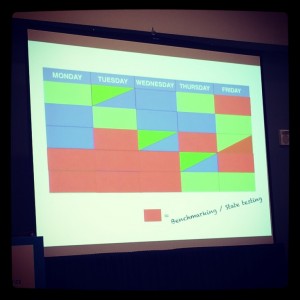 Geoff Krall’s session title, “Fumbling toward Inquiry: Starting Strong in Problem-Based Learning” gave us permission to continue to grow in this type of teaching while acknowledging “real-life” teacher challenges. This colorful slide from Geoff’s session gave me some #MTBoS Affirmation that my classroom may resemble that of many of us who want to press forward, with intentionality and variety in our teaching techniques… while functioning within some inevitable structures of public education (namely, time-pressures and high-stakes testing, both at the state and district level).
Geoff Krall’s session title, “Fumbling toward Inquiry: Starting Strong in Problem-Based Learning” gave us permission to continue to grow in this type of teaching while acknowledging “real-life” teacher challenges. This colorful slide from Geoff’s session gave me some #MTBoS Affirmation that my classroom may resemble that of many of us who want to press forward, with intentionality and variety in our teaching techniques… while functioning within some inevitable structures of public education (namely, time-pressures and high-stakes testing, both at the state and district level).
In this sample planning calendar slide, BLUE days signify direct instruction, GREEN days signify problem-based lessons, and those RED days… you guessed it… benchmarking/state testing days. To me, Geoff showed this slide with equal doses of reality and tongue-in-cheek humor, but I found a strange comfort in his acknowledging these challenges nonetheless.
Robert Kaplinsky explicitly stated in his session that doing 1 or 2 tasks per unit can be a “sweet spot” and starting a unit with a task can be particularly powerful. Robert also said (I’m paraphrasing here, but not by much) that he’d rather we “suck” at implementing a task that has already been tested and vetted BEFORE being shared freely in the blog-o-sphere than “sucking” at a task we may have put together from scratch that (we may not realize) begins with a “sucky” problem that was doomed from the start. I appreciated this advice tremendously, and I think it’s worth sharing with colleagues who may take their first stabs at tasks like this… because developing “good” ones, as Robert said, can take a “long-a$$-time.”
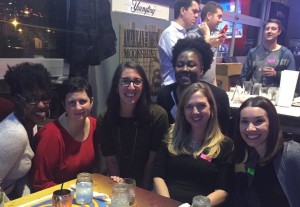 (3) Real-life in-person interactions strengthen our virtual-professional relationships.
(3) Real-life in-person interactions strengthen our virtual-professional relationships.
I met SO MANY PEOPLE whose work I respect and who have inspired me in so many ways. Talking in person only grows that connection. I wouldn’t hesitate to reach out to any one of the #MTBoS members I had the pleasure of getting to know better this week. The SINCERITY of our passions and desires to improve and bring others along on the journey was undeniable. A shout-out to my roomie Laila Nur for refreshing conversations about instruction, standards-based grading, leadership, and life! So glad to have connected with you! Additionally, it was great fun to find out just how alike we are (in pretty much every way) Julie Reulbach!
I’ll admit it… meeting Tweeps in person left me a little star-struck more than once 🙂 but the truth is we’re all normal people with genuine hearts for teaching math and serving our students better. Getting there requires all of us to continue to work together… because the smartest person in the #MTBoS… IS the #MTBoS.
That being said… though we have the #MTBoS at our fingertips 24-7, there is tremendous value in bringing people together for math-fellowship in person. Are you attending professional conferences? Will we meet at a future NCTM? I hope so!
Want to read more about #NCTMregionals Nashville? Check out this reflective post by Tracy Zager. Here’s another follow-up reflection from Jonathan Schoolcraft.
See you in the Math-Twitter-Blog-o-Sphere.
Sessions I attended at #NCTMregionals Nashville:




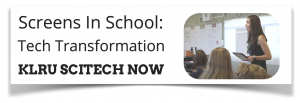
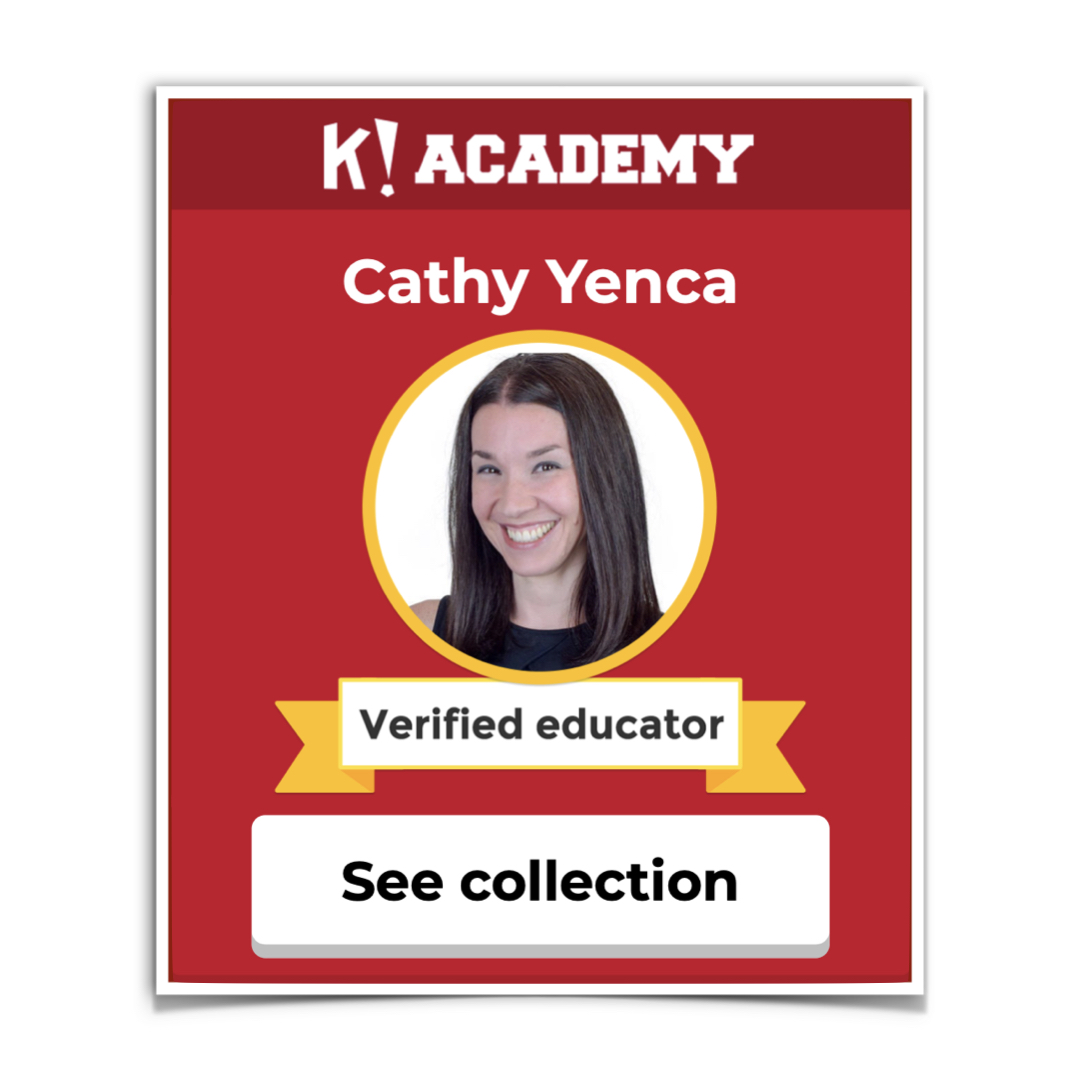
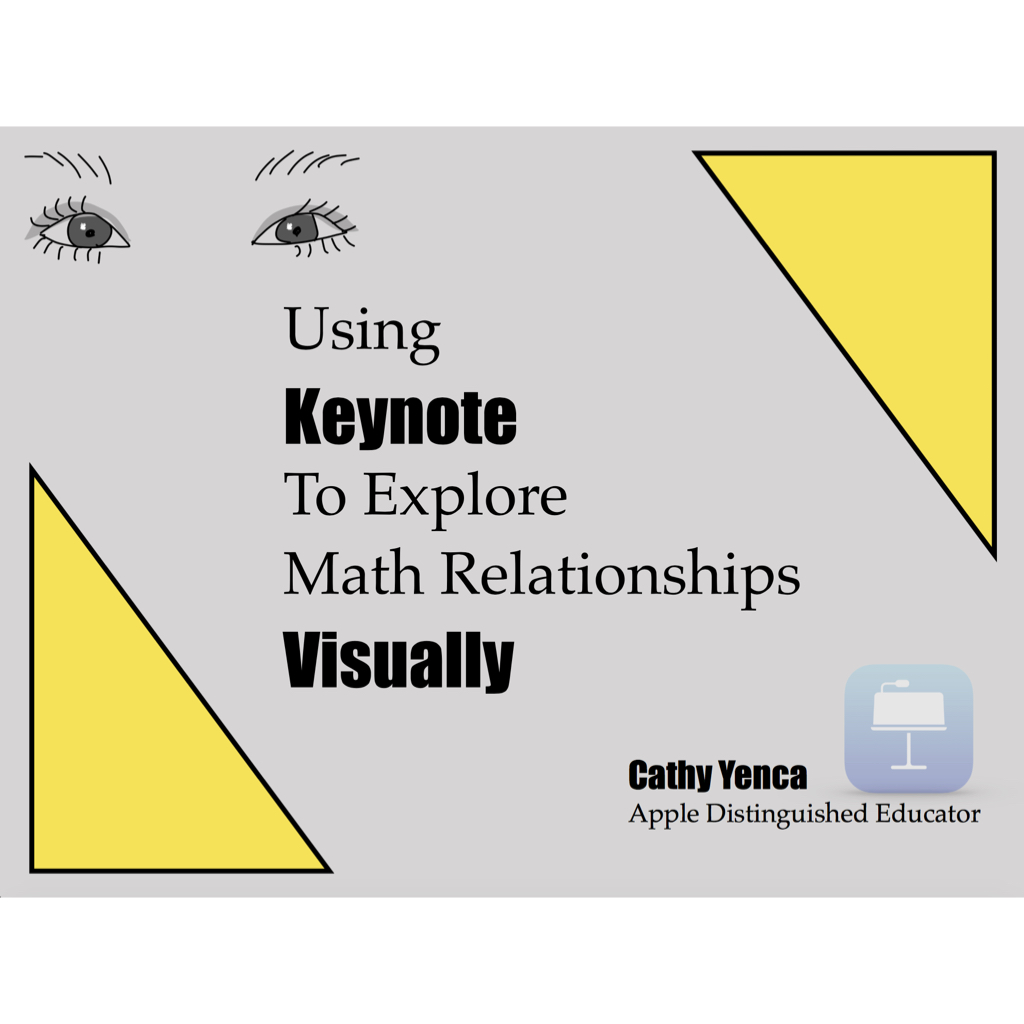
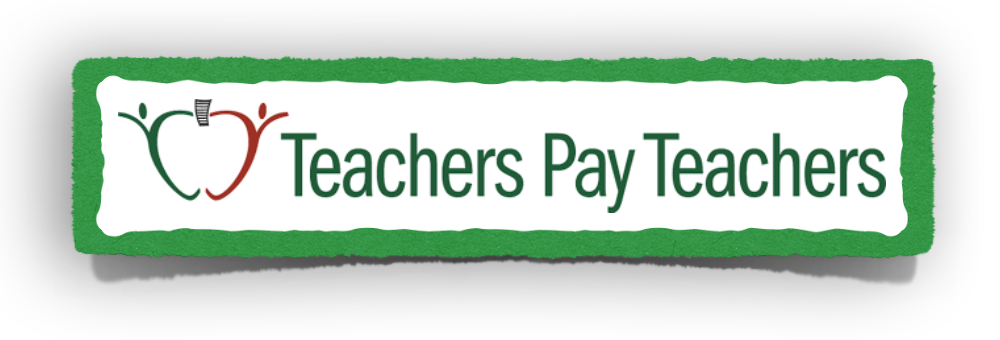




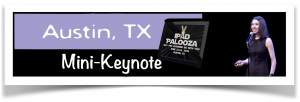


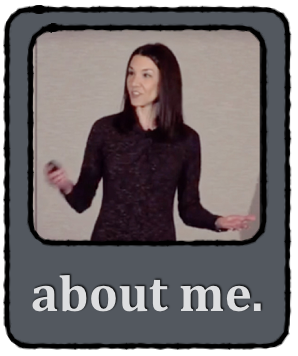
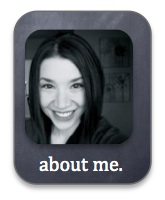
This is fun to read. I love the common themes between your post, Tracy’s, the conversations I had, and my own experiences: the people in the MTBoS are great in person and getting to know them in real life is very valuable.
I agree that you got my message pretty much as I think it. I guess I didn’t realize I use such colorful language. Ha!
Thanks for your comments, Robert! Your colorful language drove your points home for me, and I’m quite sure others in the room felt similarly. Thanks for sharing both your insight and experience. I look forward to adding greasy, cheesy burgers to my curriculum, thanks to your task!
Great recap, Cathy! I sat down to write my own recap this evening, and am finding it far more fun to read others’ thoughts on what made Nashville such a great experience. It was a treat to meet you in person, and I loved hanging out at the MTBoS booth. Looking forward to more connections in the future. 🙂
P.S. Thanks for attending my sessions. Not only was it nice to have some familiar faces in the room, but it was also fun knowing that whoever was sitting near you had the benefit of a Twitter-and-Desmos superstar for their pair-share buddy.
Michael, the pleasure was truly mine! Thank you for all the fine work you’re doing and sharing – you truly inspire!
Anyone reading this who wants to know what I’m talking about… swing on over to teacher.desmos.com as well as learn.desmos.com.
Pingback: NCTM Nashville 2015 | Reason and Wonder
Cathy,
Sounds like you had an amazing time. Heck, how couldn’t you when you’re surrounded by such a great group. So sad I missed out.
Thanks for sharing your reflection. Feel like I got a chance to scratch the surface on some of the great learning you did while there.
Kyle! You were missed! I hope your ears were burning throughout the conference, as your name and fine work came up in many conversations! 😉
Pingback: Book Creator, Take 3! | MathyCathy's Blog – Mrs. Cathy Yenca
Pingback: iPadpalooza Reflections #iplza16 | MathyCathy's Blog – Mrs. Cathy Yenca